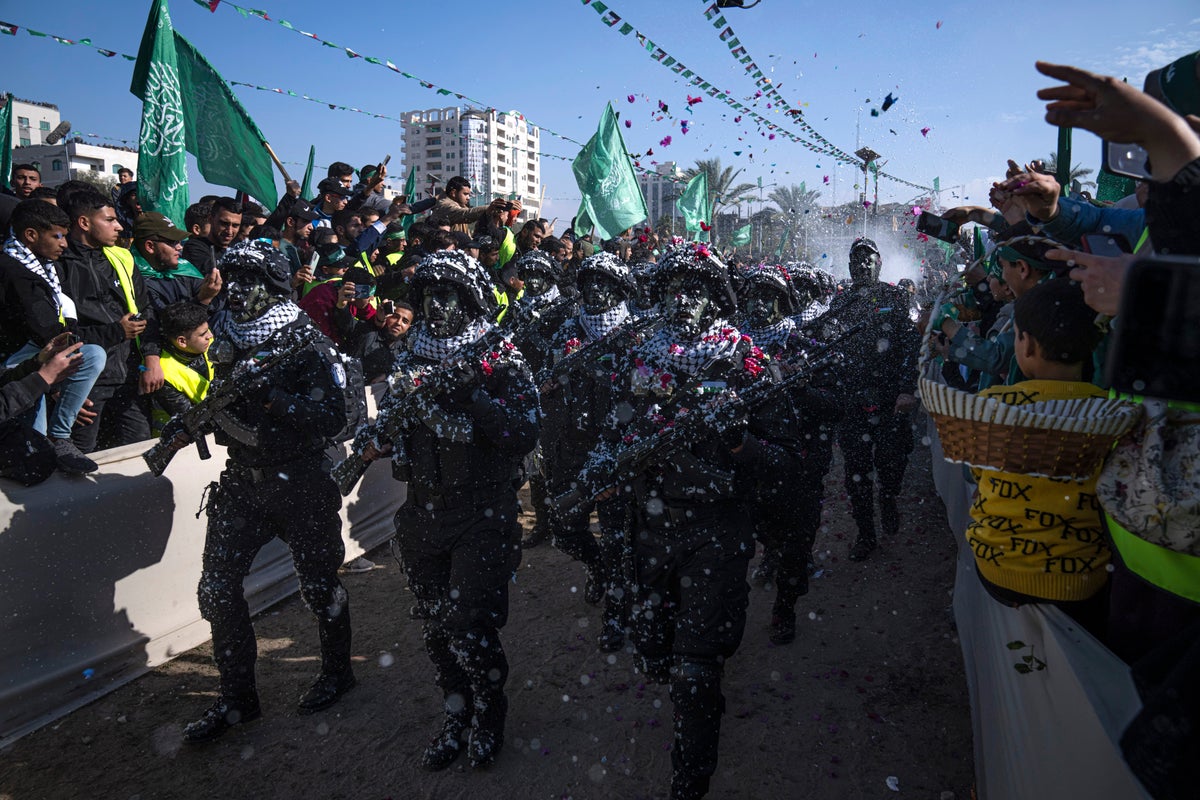
Hundreds of thousands of Palestinians on Wednesday thronged a rally in downtown Gaza to mark the 35th anniversary of the founding of the Hamas militant group, as leaders predicted a year of “open confrontation” with the hardline Israeli government expected to take office in the coming days.
Hamas, an armed Islamic group that has ruled the Gaza Strip since 2007, worked hard to mobilize the large turnout at the city's Katiba park, viewing it as a show of strength at a time when it appears to be struggling for popularity.
Hamas seized control of the impoverished enclave from forces loyal to Palestinian Authority President Mahmoud Abbas, whose administration has been confined to the Israeli-occupied West Bank.
Israel and Egypt have maintained a blockade on Gaza since the Hamas takeover, tightly controlling the movement of people and goods in and out of the territory in what Israel says is a security measure. Gaza's economy has gone into a tailspin, and the territory has fought four wars and numerous skirmishes with Israel since Hamas took power.
During the rally, Hamas leaders predicted an “open confrontation” with Israel in 2023 as the most right-wing government ever is expected to be sworn in later this month.
“We have to give the chance to ignite the resistance in the West Bank,” said Yehiyeh Sinwar, Hamas' leader in Gaza.
More than 150 Palestinians have been killed by Israel in the West Bank and east Jerusalem this year, making it the deadliest year since 2006. Israel says most of those killed were militants, though stone-throwing youths and people uninvolved in fighting have also been killed.
Sinwar slammed Abbas, calling for an end to the Palestinian Authority’s security coordination with Israel, which he said hurt mounting resistance to Israeli raids in the West Bank. The Israeli military maintains quiet coordination with Abbas' forces in a shared struggle against Islamic militants.
Hamas also displayed what it said was the assault rifle of Hadar Goldin, an Israeli soldier who along with Oron Shaul was killed in a 2014 war inside Gaza.
Sinwar said Israel has “a limited amount of time” to swap Palestinian prisoners it is holding for the remains of Goldin and Shaul “or we close this file for good.”
While Hamas leaders directed fiery rhetoric at Israel and Abbas, they overlooked the increasing suffering of the 2.3 million residents of Gaza under its rule.
While the blockade has stifled Gaza's economy, critics note that the groups has continuously upgraded its arsenal, including digging attack tunnels into Israel and improving rocket capabilities.
Critics say the group diverts money towards its administration and military wing, while the international community and the PA pay for most of health, education, social and other services for Gaza’ population.
Hamas’ heavy-handed rule allows no room for opposition, and the group has banned protests against it and jailed critics.
Many of the group's top leaders also have left Gaza for more comfortable locations in places like Turkey and Qatar.
A poll conducted this month by the Palestinian Center for Policy and Survey Research, a respected think tank based in the West Bank, found that Hamas remains more popular than Abbas' Fatah party in the Gaza Strip. It said 43% of respondents would vote for Hamas in a parliamentary election, compared to 34% for Fatah. Still, the poll found that just 6% of Gazans think the situation in the territory is positive, and 69% believe that Hamas-run institutions suffer from corruption.
The poll interviewed some 1,200 people and had a margin of error of 3 percentage points.







